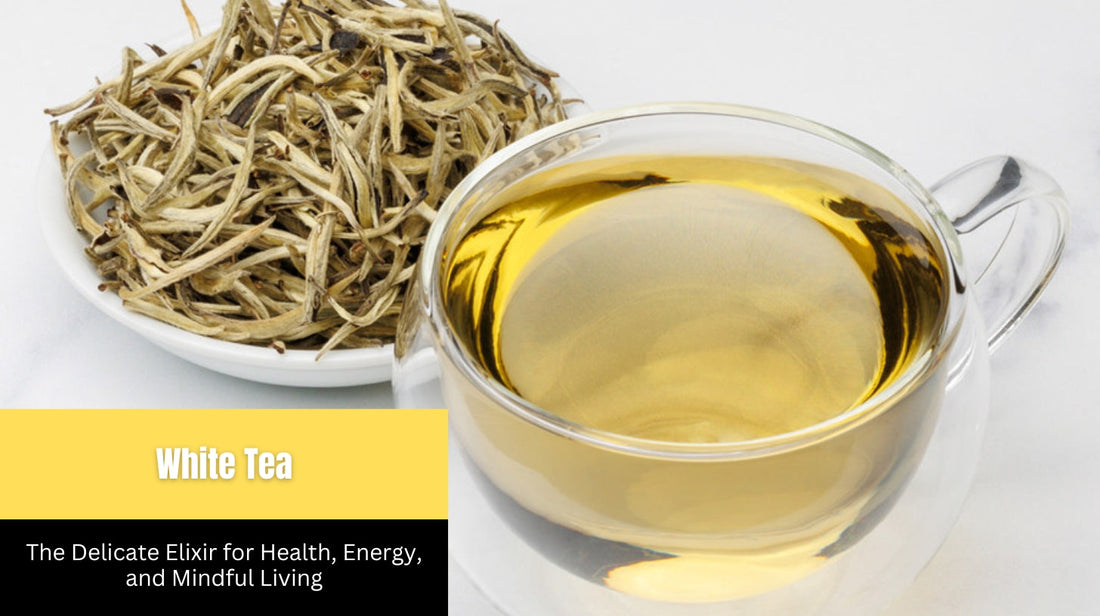
White Tea: The Delicate Elixir for Health, Energy, and Mindful Living
What is White Tea?
White tea is often called the “champagne of teas” delicate, rare, and naturally refreshing. Unlike green or black tea, which go through more processing, white tea is made from the youngest buds and leaves of the Camellia sinensis plant. These tender leaves are carefully plucked, gently dried, and minimally processed, preserving their natural antioxidants and subtle sweetness.
The result? A cup that is:
- Light in color, almost golden.
- Smooth in taste with soft floral or fruity notes.
-
Naturally lower in caffeine than coffee or black tea.
For centuries, white tea has been valued not just as a beverage but as a wellness ritual. Today, it’s gaining global popularity as people search for healthier, mindful alternatives to sugary drinks and heavy caffeine.
If you’re curious to try authentic Nepal White Tea, you can explore our collection here: Danfe Nepal White Tea Collection.
Health Benefits of White Tea
White tea isn’t just refreshing, it's packed with wellness perks. Let’s break down the science-backed benefits:
1. Rich in Antioxidants
White tea contains polyphenols (like catechins) that protect your cells from damage. Antioxidants are known to:
- Slow down aging.
- Reduce oxidative stress.
-
Support overall immunity.
2. Boosts Skin Health
White tea is often found in skincare products because its antioxidants fight free radicals that cause wrinkles and dull skin. Regularly drinking it may help keep your skin glowing from within.
3. Supports Heart Health
Studies suggest that drinking white tea regularly may lower cholesterol levels and improve blood circulation, helping reduce the risk of heart disease.
4. Aids in Weight Management
White tea can gently boost metabolism and encourage fat breakdown. Paired with a balanced lifestyle, it’s a natural way to support healthy weight goals.
5. Gentle Energy & Focus
With less caffeine than coffee but more than herbal teas, white tea provides just the right amount of energy without jitters or crashes. It’s perfect for:
- Morning focus
- Midday refreshment
-
Evening calmness
6. Oral Health Support
White tea naturally contains fluoride, tannins, and catechins, which may strengthen teeth, fight bacteria, and support healthy gums.
White Tea Caffeine: How Much is in Your Cup?
One of the most common questions is: Does white tea have caffeine?
Yes, but in smaller amounts compared to coffee or black tea.
- White Tea (per cup): 15–30 mg of caffeine
- Green Tea (per cup): 30–50 mg
-
Coffee (per cup): 95–200 mg
This makes white tea a fantastic choice if you:
- Want to cut back on caffeine
- Need steady energy without jitters
-
Enjoy an evening tea without worrying about staying awake all night
If you want to explore varieties, check out our Nepal White Tea range for both classic sips and rare loose-leaf treasures.
White Tea Shot Recipe – A Trendy Twist
Lately, white tea shots have been trending on TikTok and cocktail menus. But what exactly are they?
A classic white tea shot (popular in bars) is actually a cocktail made with peach schnapps, vodka, sweet & sour mix, and a splash of Sprite. Despite the name, it often doesn’t contain actual white tea.
But here’s the exciting part: You can make your own real white tea shot recipe at home for both wellness and fun!
Refreshing White Tea Shot (Non-Alcoholic)
Ingredients:
- 1 cup brewed Danfe Nepal White Tea (chilled)
- ½ teaspoon honey (optional)
- 1 splash lemon juice
-
Ice cubes
Instructions:
- Brew white tea and let it cool.
- Shake with ice, honey, and lemon in a cocktail shaker.
-
Pour into shot glasses and enjoy!
This is perfect for:
- A refreshing afternoon pick-me-up
- A healthy mocktail for parties
-
Boosting hydration with flavor
For best brewing results, we recommend using our Silicone Handle Tea Infuser. It’s durable, stylish, and makes steeping loose-leaf tea quick and easy.
How to Brew the Perfect Cup of White Tea
Brewing white tea is simple but requires care to preserve its delicate flavor. Here’s a quick guide:
- Water Temperature: Use water around 75–85°C (not boiling). Boiling water can burn the tender leaves.
- Tea Quantity: Use 2 teaspoons of loose-leaf white tea per cup.
- Steeping Time: Steep for 2–4 minutes depending on how strong you like it.
-
Tools: For the best experience, try the Silicone Handle Tea Infuser.
Pro Tip: Re-steep your white tea leaves 2–3 times. The flavor evolves beautifully with each infusion.
Why Choose Nepal White Tea?
At Danfe Tea, our white tea comes from the high Himalayan gardens of Nepal. The altitude, pure air, and rich soil create a tea that is:
- Naturally sweet and floral.
- Hand-picked and minimally processed.
-
Packed with antioxidants and wellness benefits.
Unlike mass-produced teas, Nepal White Tea is crafted in small batches with love and tradition bringing you purity in every sip.
Ready to bring the delicate magic of white tea into your daily life?
Explore our handpicked collection of authentic Nepal White Tea and discover the perfect blend for your wellness journey.
Don’t forget to add the Silicone Handle Tea Infuser to your cart—it’s the easiest way to brew your loose-leaf tea like a pro.
FAQs
Q1: Does white tea have caffeine?
Yes, but much less than coffee or black tea. About 15–30 mg per cup, making it a gentle energy booster.
Q2: Can I drink white tea every day?
Absolutely! White tea is safe and beneficial for daily consumption. 2–4 cups per day is ideal.
Q3: Is white tea better than green tea?
Both are healthy, but white tea is more delicate and less processed, often containing higher antioxidant levels.
Q4: How does white tea taste?
It’s light, smooth, slightly sweet, and sometimes floral or fruity refreshing without bitterness.
Q5: What’s the best way to brew white tea?
Use water around 75–85°C, steep for 2–4 minutes, and enjoy. Avoid boiling water.










